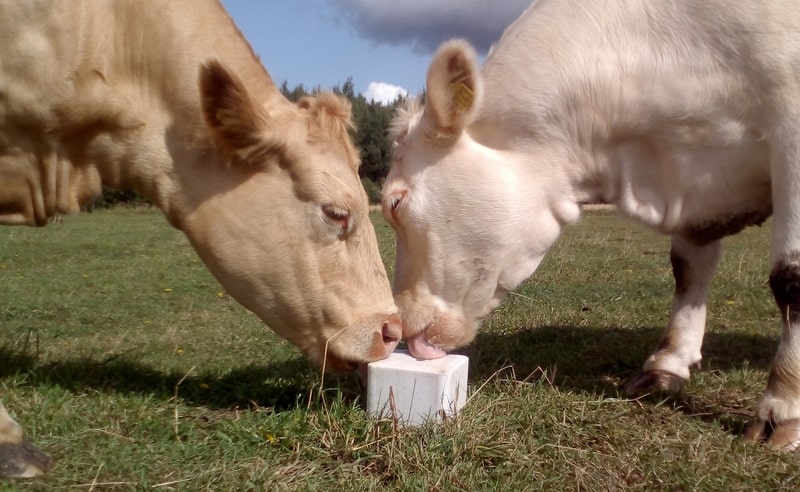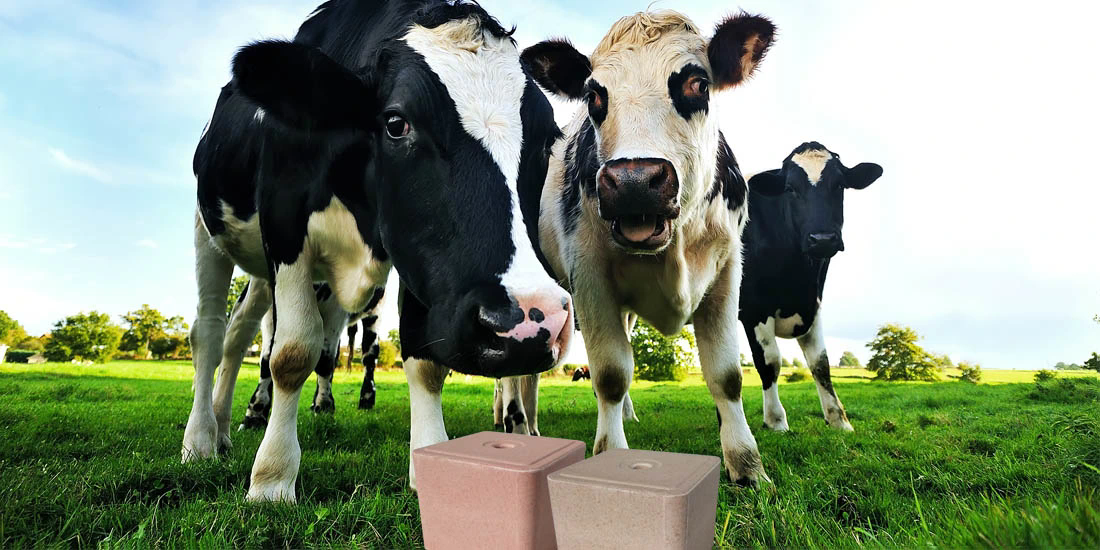Why Do Cows Lick Salt?
2022-08-12
Cows, just like any other animal, require certain nutrients to ensure that their bodies are working properly. Cattle seem to have a natural “urge” for salt which means that unlike other minerals, they will go out of their way to seek it out. If they cannot find it, they often try to ingest it from other sources, such as dirt and tree barks. So why do cows lick first salt in the first place?

Cows lick salt because it helps perform several vital processes within their bodies including water regulation. Sall licking allows cows to meet their need for sodium and other minerals. When salt is deficient in a cow’s diet, it may lead to a loss of appetite (which in turn leads to weight loss), a decrease in urine output, and a decrease in milk production, among other issues.
Why Do Cows Need Salt and Minerals?
Cows need salt for the proper function of the nervous system as well as their muscles. Salt helps to regulate the body pH and the amount of water within the body. A deficiency in salt results in a loss of appetite and body weight loss.
Salt is a mineral that is composed primarily of sodium chloride. Sodium is often deficient in a cow’s diet, but chlorine levels are usually sufficient. Both of these minerals are present in a cow’s soft tissues and fluids, but there is very limited storage of these elements, so a constant supply of salt must be provided.
Phosphorus and calcium are major mineral components that are stored in a cow’s bones. Long-term deficiencies of either mineral can cause bone weakening and even breakage.
Magnesium is important for proper enzyme and nervous system function, as well as for efficient carbohydrate metabolism.
Potassium is essential for maintaining osmotic pressure, acid-base balance, and the amount of water retained in the body.
How Much Salt Do Cows Need?
Cows need to consume 0.005 to 0.010 percent of their body weight as salt daily. For example, a 600-pound cow should get at least 0.48 ounces of salt daily, while a 1,200-pound cow would consume 0.06 to 0.12 pounds of salt daily.
Cattle will seek out more salt when the forage is young and succulent than when it is mature. Cattle that feed on silage will consume more salt than those that are fed hay, and consumption is higher in cattle fed diets that have high roughage than in those fed high-concentrate diets.
Can Cows Drink Salt Water?
Cows can drink salt water, but this should not be your go-to source of salt as there’s an increased risk of overconsumption. Excessive salt in cattle drinking can upset the cows’ water balance and even cause death in extreme cases. Unsafe levels of salt depends on the age of the cow, its stage of production and the amount of water that it consumes daily.
To reduce the risk of excessive consumption of salt in cattle, provide salt blocks or loose salt instead of salt water, and have your chosen salt source close to their water supply. Here are some guidelines on the levels of salts in water:
- Less than 1,000 ppm (1 ppm = 1 mg/liter of water): these waters have a relatively low level of salinity and should be safe for cows to drink.
- 1,000-2,999 ppm: waters of these salinity levels may cause temporary and mild diarrhea in cows that are not accustomed to them, but should generally not affect their health and performance
- 3,000-4,999 ppm: these waters may cause mild diarrhea or be refused initially by cows not accustomed to them
- 5,000-6,999 ppm: these waters can be used with reasonable safety for both beef and dairy cattle, but they may not be suitable for pregnant and lactating animals.
- 7,000-10,000 ppm: these waters should generally be avoided, although older cattle may subsist on them under conditions of maintenance and low stress.
- Greater than 10,000 ppm: due to the high salinity of these waters, they are not recommended for cows.
How Long Can Cows Go Without Salt?
Cows should not go longer than a couple of days without salt. Salt deficiency in the diet will cause reduced appetite, weight loss, reduced water intake, and reduced milk production.
Lack of salt can also cause pica, which is a desire to eat things that don’t have any nutritional value. This unusual behavior includes persistent chewing, eating, or licking of wood (tree bark, fence posts, wood partitions, sticks, etc.), soil (clay, dirt, stones), rags, and plastic objects. Pica can have detrimental consequences on the cow and could potentially cause gut blockage and lead to death if it is prolonged or left untreated.
How Do Cows Get Salt in the Wild?
In the wild, cows will look for salt springs or salt deposits in nature which are sometimes referred to as salt licks. They will only consume the amount of salt that they need to obtain the necessary nutrients and satisfy their craving.
Is Rock Salt Good for Cows?
Rock salt is good for cows as it is often enhanced with specific minerals to enhance general health and productivity. Some of the trace elements commonly found in rock salt include:
This is essential for the production of vitamin B12 in cows. Cobalt deficiency can lead to poor growth rates and lack of appetite.
Copper is important for a cow’s immune system, fertility, and healthy coat appearance.
Selenium is essential during pregnancy. Deficiencies can lead to weak calves at birth and further complications down the line such as weight loss and general lack of thrive.
Magnesium deficiency can be associated with poor reproductive efficiency and lameness.
Calcium is vital for bone formation, skeletal strength, and milk production.
Is Table Salt Good for Cows?
Table salt is good for cows as it is a combination of minerals that a cow needs to perform several vital processes within the body. However, it contains nothing more than sodium chloride, so if you need to supplement other minerals in the diet, you may want to try other salt options.
Are Salt Blocks Good for Cows?
Salt blocks are the top choice source of salt for many cattle owners. The cows can lick off the salt whenever they need it, and most salt blocks can withstand rain and rough weather. They generally last longer than loose salt as there is less opportunity for waste.











